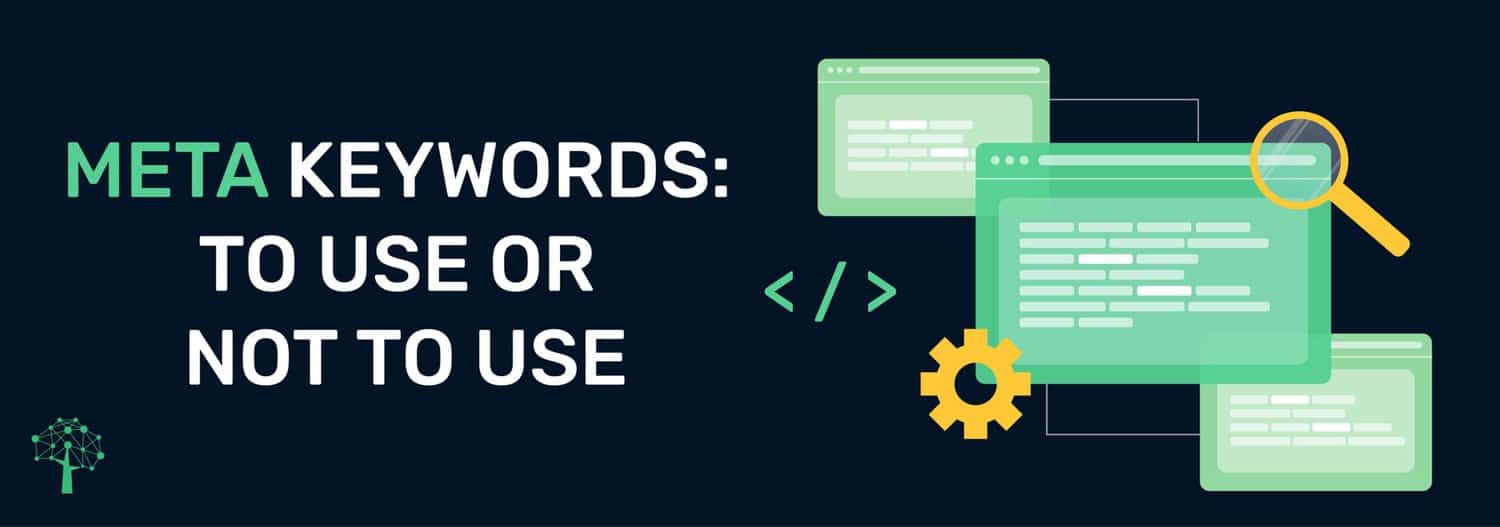Improving SEO is as indispensable as it gets to online marketing. Any website or blog would do anything possible to get high rankings on search engine results pages. There are all sorts of advice about what to do and what not to do to improve your SEO strategy. Meta keywords are one of those debatable topics related to SEO.
What are meta keywords? How effective can they be?
Many SEO experts suggest that they are a thing of the past, yet many still use it. We shall find out why meta keywords are debated in the digital world.
Optimizing a website for search engines requires a comprehensive technical and content strategy. One small but potentially impactful factor is ensuring your page markup contains relevant, thoughtful meta keywords. Defined in the page’s HTML code, meta keywords specify a webpage’s main topic and keywords. While meta keywords alone won’t lead to high rankings, they provide helpful cues to search engines.
This guide will explain meta keywords, proper optimization best practices, their role in SEO, and how to leverage them effectively as part of an integrated approach. With strategic meta keyword placement, sites can improve keyword targeting, visibility in search results, and user intent matching. We’ll demystify meta-keyword optimization, from extracting the right terms during research to updating tags regularly and avoiding stuffing. If you want to maximize the SEO value of your metadata in 2023, leveraging meta keywords as a supportive element may help unlock more opportunities.

Meta Keywords: A Definition and Brief History
Meta keywords, also known as meta tags, are snippets of text embedded within the HTML code of a webpage. These keywords are not visible to users when they visit the page, but they are used by search engines to index and categorize the content. In the early days of SEO, meta keywords played a crucial role in determining search rankings. However, as search engine algorithms became more sophisticated, the emphasis on meta keywords has declined.
Are Meta Keywords Still Relevant in 2023?
While keywords may not be the direct ranking factor they once were, they still serve several important purposes:
- Providing Context to Search Engines: Keywords help search engines understand the main topics and themes of a webpage, enabling them to match it with relevant search queries.
- Guiding Content Creation: Keywords can be used as a starting point for content creation, ensuring that the page’s content is aligned with user search intent.
- Tracking Search Performance: By monitoring which keywords are generating traffic and conversions, website owners can gain valuable insights into their target audience’s search behavior.
Table of Contents
Definition of Meta Keywords
Meta keywords are a type of metadata tag that reflects your content. Most people are familiar with tags, thanks to Twitter and other social media platforms. They are called “metadata” tags because they are data about the data on your page.
Unlike primary keywords, for example, meta keywords do not appear on the web page’s content. They do not target readers or even humans.
They are only visible in a webpage’s code (HTML), and they exist only to be read by machines, i.e., search engines. Meta keywords instruct the search engine to rank your website based on your added keywords. This is what they may look like:
You can find this information by right-clicking anywhere on any webpage and clicking “view source code.” So in brief, meta keywords are a list of keywords that you insert in the code of your page to tell the search engine what your content tackles.
Many websites in the past have exploited this tactic of SEO, which you will find out more about below.
Meta keywords are HTML tag attributes that specify relevant keywords for a specific webpage. They are placed in the <head> section of the page markup and look like:<meta name=”keywords” content=”keywords, keyword list, keyword phrases”>
Meta keywords help search engines understand the topic of a page. However, they have diminished importance compared to on-page content itself.
Best practices for optimizing keywords:
- Include 5-10 keywords per page, separated by commas. Avoid overstuffing.
- Match page-specific keywords to content and intent. Don’t use unrelated terms.
- Include variations and long-tail versions of keywords.
- Place the most important keyword first.
- Regularly updated to reflect the new page content.
- Check ranking keyword terms and add synonyms.
- Don’t rely only on meta keywords. Optimize actual content first.
Optimizing Keywords for SEO Success
Despite their reduced impact on search rankings, keywords can still be a valuable asset in an SEO strategy. Here are some key guidelines for optimizing keywords:
- Quality over Quantity: Focus on using a few highly relevant and specific keywords rather than a large number of generic keywords.
- Strategic Placement: Place your primary keyword at the beginning of the keywords list and consider incorporating variations and long-tail keywords.
- Natural Integration: Avoid keyword stuffing and ensure that the keywords are naturally integrated into the page’s content.
- Regular Review and Update: Regularly review and update your keywords to reflect changes in search trends and your website’s content.
Comparative importance:
While search engines analyze meta keywords, other on-page factors have a greater impact, including:
- Page title tags
- Headings (H1, H2)
- Image file names and alt text
- URL slugs
- Schema and structured data
- Actual page content
Meta keywords support other optimization efforts but are just one small ranking factor. High-quality content should take priority.
Navigating the Meta Keyword Landscape: A Comprehensive Guide to 2023 and Beyond
In the ever-evolving realm of search engine optimization (SEO), meta keywords have long been a subject of debate and discussion. While their influence on search rankings has diminished over time, meta keywords still hold a place in the SEO toolkit, providing valuable insights into user search intent and contributing to a well-rounded SEO strategy.
Meta Keywords: A Definition and Brief History
Meta keywords, also known as meta tags, are snippets of text embedded within the HTML code of a webpage. These keywords are not visible to users when they visit the page, but they are used by search engines to index and categorize the content. In the early days of SEO, meta keywords played a crucial role in determining search rankings. However, as search engine algorithms became more sophisticated, the emphasis on meta keywords has declined.
Are Meta Keywords Still Relevant in 2023?
While meta keywords may not be the direct ranking factor they once were, they still serve several important purposes:
- Providing Context to Search Engines: Meta keywords help search engines understand the main topics and themes of a webpage, enabling them to match it with relevant search queries.
- Guiding Content Creation: Meta keywords can be used as a starting point for content creation, ensuring that the page’s content is aligned with user search intent.
- Tracking Search Performance: By monitoring which meta keywords are generating traffic and conversions, website owners can gain valuable insights into their target audience’s search behavior.
Optimizing Meta Keywords for SEO Success
Despite their reduced impact on search rankings, meta keywords can still be a valuable asset in an SEO strategy. Here are some key guidelines for optimizing meta keywords:
- Quality over Quantity: Focus on using a few highly relevant and specific keywords rather than a large number of generic keywords.
- Strategic Placement: Place your primary keyword at the beginning of the meta keywords list and consider incorporating variations and long-tail keywords.
- Natural Integration: Avoid keyword stuffing and ensure that the keywords are naturally integrated into the page’s content.
- Regular Review and Update: Regularly review and update your meta keywords to reflect changes in search trends and your website’s content.
EEAT Guidelines: Ensuring Authorship and Expertise
When creating content related to SEO, it is crucial to adhere to Google’s EEAT guidelines, which emphasize Expertise, Experience, Authoritativeness, and Trustworthiness. To ensure that your meta keyword content meets these guidelines:
- Author Credentials: Clearly identify the author of the content and provide evidence of their expertise in SEO.
- Experience and Knowledge: Draw upon personal experience and knowledge to provide valuable insights and practical advice.
- Authoritativeness and Trustworthiness: Establish your credibility by citing reputable sources and demonstrating a deep understanding of the topic.
Incorporating Latest Statistics and Facts
To keep your keyword content fresh and informative, incorporate the latest statistics and facts related to SEO. This demonstrates your commitment to providing up-to-date information and enhances the value of your content for readers.
Addressing Common Questions with an FAQ Section
An FAQ (Frequently Asked Questions) section can be a valuable addition to your content, addressing common queries and providing concise answers. This enhances the user experience and improves the overall accessibility of the information.
Optimizing for Search Intent
Understanding and aligning your content with the search intent of your target audience is essential for effective SEO. Research relevant keywords and analyze user search patterns to ensure that your content meets their needs and expectations.
Additional Considerations for Enhancing Your Content
- Readability and Formatting: Make your content easy to read and scannable by using clear headings, subheadings, bullet points, and visuals.
- Engaging Writing Style: Write in a clear, concise, and engaging style to keep readers’ attention and make the information more memorable.
- Content Promotion: Promote your meta keyword content on social media, relevant online communities, and through email marketing to reach a wider audience.
Where Did It Go Wrong?

Back when web searching was still a new industry, meta keywords were valuable for better SEO results. However, these days did not last long.
You know when people say that we are all born innocent and straightforward, and as we grow older, we become complicated and deceiving? To a great extent, this is what happened to web searching. So, do Meta Keywords still matter?
Meta keywords allowed website owners to “directly command” the search engine to rank their articles based on whatever they inserted as meta keywords. You can guess what happened next.
As the search industry grew more popular and, therefore, more commercial, website owners manipulated the tool. They started to insert keywords irrelevant to the page’s content just because those keywords were trending and would bring many viewers. In the digital marketing world, this is called black hat SEO or SEO spam.
What Happened Next?
In 2009, Google announced that meta keywords are no longer effective in ranking. Although Google is pretty close-mouthed when explaining how their algorithm works, this is one of the few occasions where they were not discreet about it.
Google and other search engines decided to devalue that tool to maintain the quality of search results. To guarantee that researchers reach credible results whenever they perform search queries, they had to give up on that ranking factor since websites were abusing it.
Should you Stop using Meta Keywords?
Now, this is controversial. Many SEO experts suggest that you should not use them at all. Nevertheless, nineteen percent of websites still use meta keywords. It comes naturally to ask why they still use them if they do not count in the ranking.
There is a 0.001 chance that search engines may look at those tags; users do not want to miss that chance. As mentioned, search engines’ algorithms are always kept secret so nobody can manipulate the results.
Therefore, some websites still prefer to use meta keywords to be on the safest side because who knows about those algorithms anyway? On the other hand, the remaining eighty-one percent are not convinced by this theory.
What if You Want to Use Them?

If you wish to use meta keywords in your code, you should be careful about using them, in order not to be blacklisted by search engines. You do not want that to happen.
The first and most important condition is to avoid using high-volume keywords irrelevant to your content; this will not get you anywhere and is considered spam. Second, it is recommended to use ten keywords at most; do not “stuff” your list with more keywords in the hope of getting more viewers.
This may be a bad signal for search engines. In addition, the best tip about selecting keywords is to include long-tail keywords and common misspellings of your main topic. Meta keywords are a good place to include common misspellings because nobody likes to include spelling mistakes in the content.
How do Search Engines USE Meta Keywords now?
Generally, Search Engines such as Google, Bing and Yahoo do not tend to rank meta keywords anymore. So they are almost unneeded nowadays. Yoast, the amazing WordPress Plugin, even goes out of their way to say no to meta keywords.
So, why would you want to continue using meta keywords when all they seem to do is waste your time? Yoast has even removed the meta keywords toggle out of their updated plugin in favour of the other SEO techniques. This feature has been removed since mid-February 2018.
Google and Meta Keywords
Since Google is the world’s number one search engine, we know this because of how we live our lives. We all say ‘I’ll Google that’ when we don’t know something. It would be weird to say, ‘Let’s Bing that’, or ‘Wait, I’m going to Yahoo that’.
It might be best to know how Google still uses Meta Keywords.
Realistically, Google is very similar to other search engines such as Yahoo and Bing. It does not use the meta keywords like it once did. In short, using them might be just a waste of your time, and your main focus should be more on the Title Tags and the Meta description, which is discussed below.
Meta Tags that Matter
There are other meta tags which Google and other search engines consider significant. Most websites use these meta tags, and they can help your website reach high rankings.
Title Tags
Title tags are the titles which appear on search results pages; this is the part where researchers can click to go to a specific website. These are important because they directly express what your page includes. The first thing Google users will see is title tags when they search for anything.
Grabbing their attention with a relevant and informative title will make them want to see more of your page. Please focus on the length of your title tag; do not make it too long because Google allows a limited number of characters. Please make the most out of it, and make your title straight to the point.
Meta Description
Meta Descriptions are located exactly under title tags on search results pages. They are the second thing that your viewers’ eyes will fall on. These descriptions are like teasers to your content.
You should ensure they are interesting and reveal what your page includes in a sentence or two. Meta descriptions also have a limited number of characters. Please do not make them too short or too long; experts suggest 160-character-long is the most suitable length for meta descriptions.
Meta Tags and YouTube Video Tags, are they similar?

One area where meta keywords are still quite common is YouTube.
When you upload a video to YouTube, you can add many ‘Videotags’. These help your videos rank within the YouTube algorithm. The only difference between YouTube and Search Engines is that it is much easier to see if your tags work with different Google Extensions. This is like how Search Engines use Meta Tags to allow your sites and posts to rank.
YouTube has not taken the step of updating its Algorithm by removing the importance of keywords. This is solely due to how big this change would affect the platform. It would also make it much harder for your videos to rank, as YouTube does not have as many SEO techniques to help them rank.
This is because it is a video and is not static content. With static content, there is the content, headings, titles, descriptions, keywords, readability, images, and links, whereas YouTube can only have titles, descriptions and keywords.
Here, people can exploit this feature quite easily if a specific topic is trending and ranking well. Using these keywords can help your video rank. YouTube is trying to help this, but it is very difficult.
Alternative to Meta Keywords: Focus on Content-Length Instead
Whether you use meta keywords or not, the choice is entirely yours. If you decide not to, rest assured that you are not missing a ranking factor. The most important aspect if you decide to use them is to be careful that your keywords are not misleading the search engine.
In addition, spend more time investing in your website’s content or other important SEO tips. Remember that other meta tags, such as title tags or meta descriptions, are the window to your website. They will affect your SEO results and your number of viewers. Make sure your window looks nice and inviting to researchers. Finally, make content your top priority and work on improving it rather than focusing on meta keywords.
Frequently Asked Questions
Q: How many meta keywords should you use per page?
A: The best practice is to include 5-10 meta keywords per page. Avoid stuffing with too many keywords.
Q: How often should you update meta keywords?
A: Meta keywords should be reviewed and updated regularly as page content changes. At a minimum, every 2-3 months.
Q: Are meta keywords visible to site visitors?
A: No, meta keywords are only visible in the page code and not displayed on the live page to users.
Q: Can you get penalized for bad meta-keyword optimization?
A: Not directly, but spammy keywords can lead to manual actions if used excessively across a site.
Summary: Should You Use Meta Keywords?
As stated above, meta keywords are mostly a waste of time. In addition, we recommend you focus more on the tags and target keywords for your content.
Here’s how you should go about doing this:
Each page on your site should have a unique primary target keyword. This should be used to inform both the content of the article itself as well as all of its meta tags.
However, while you do this, it’s vitally important to avoid keyword stuffing. Instead, your body copy and meta tags should contain target keywords naturally and descriptively.
When executed properly as part of a comprehensive SEO plan, meta keyword optimization provides another avenue to reach relevant search queries and improve how engines interpret page content. However, meta keywords are less important than on-page content, quality backlinks and other technical factors.
They serve as supportive SEO elements when used ethically to target key terms. With a properly researched and updated meta keyword strategy, companies can leverage another tool to enhance visibility and rankings incrementally. Yet overreliance on stuffing meta keywords without solid content will likely lead to disappointment.
The best practice is balancing meta keyword optimization with broader SEO efforts.
For more information on how to do this, check out our guide to SEO for beginners.


